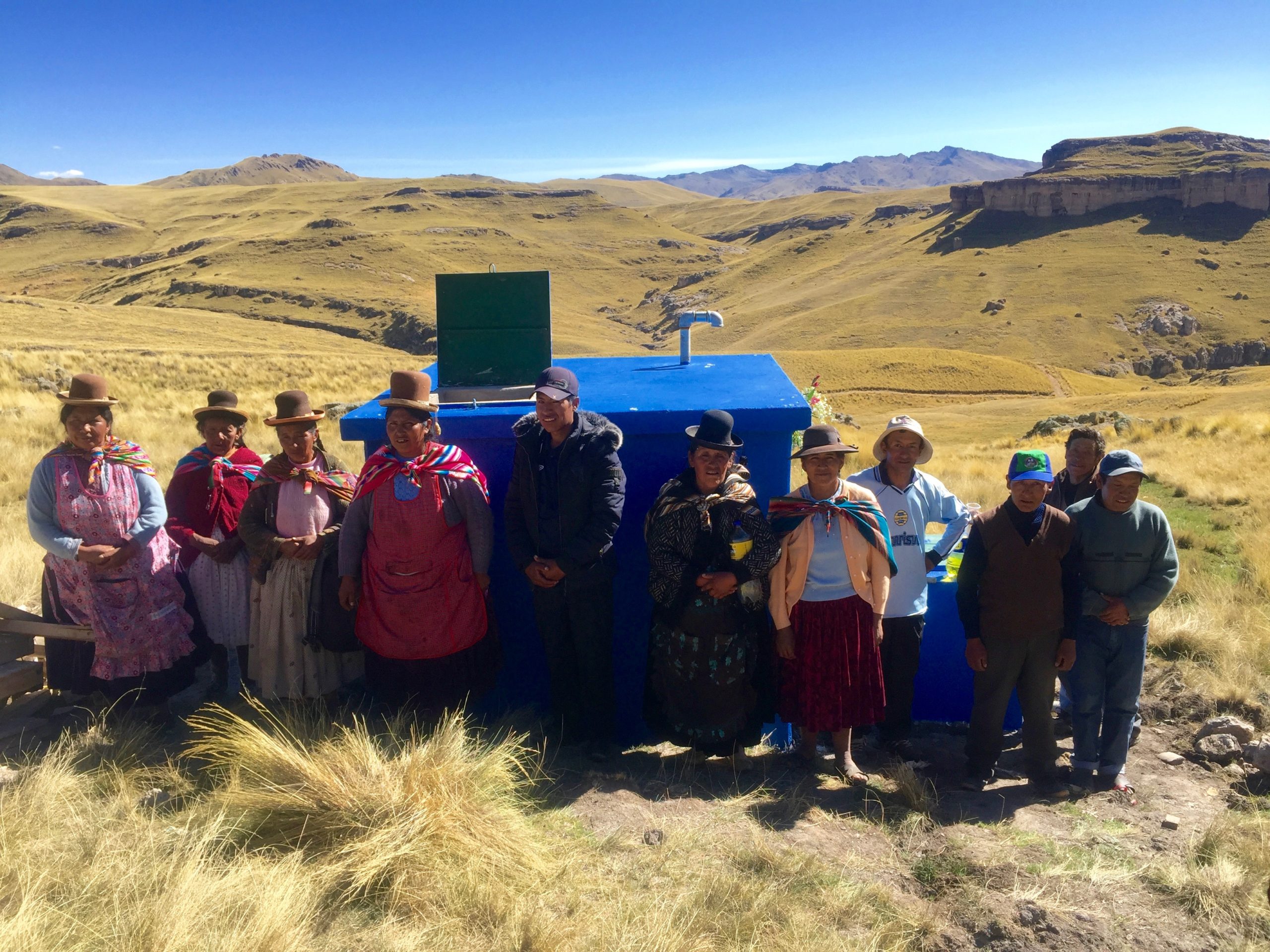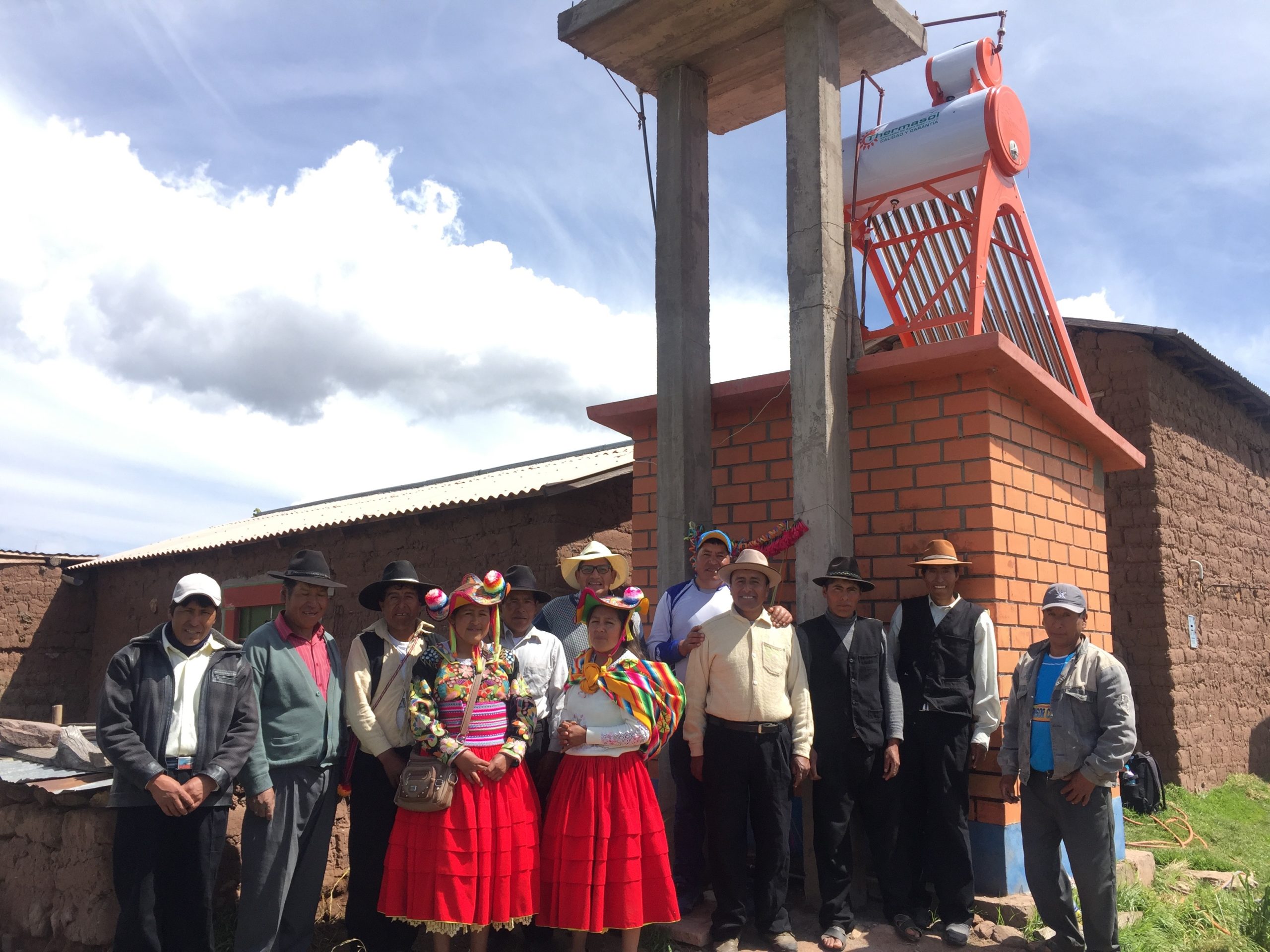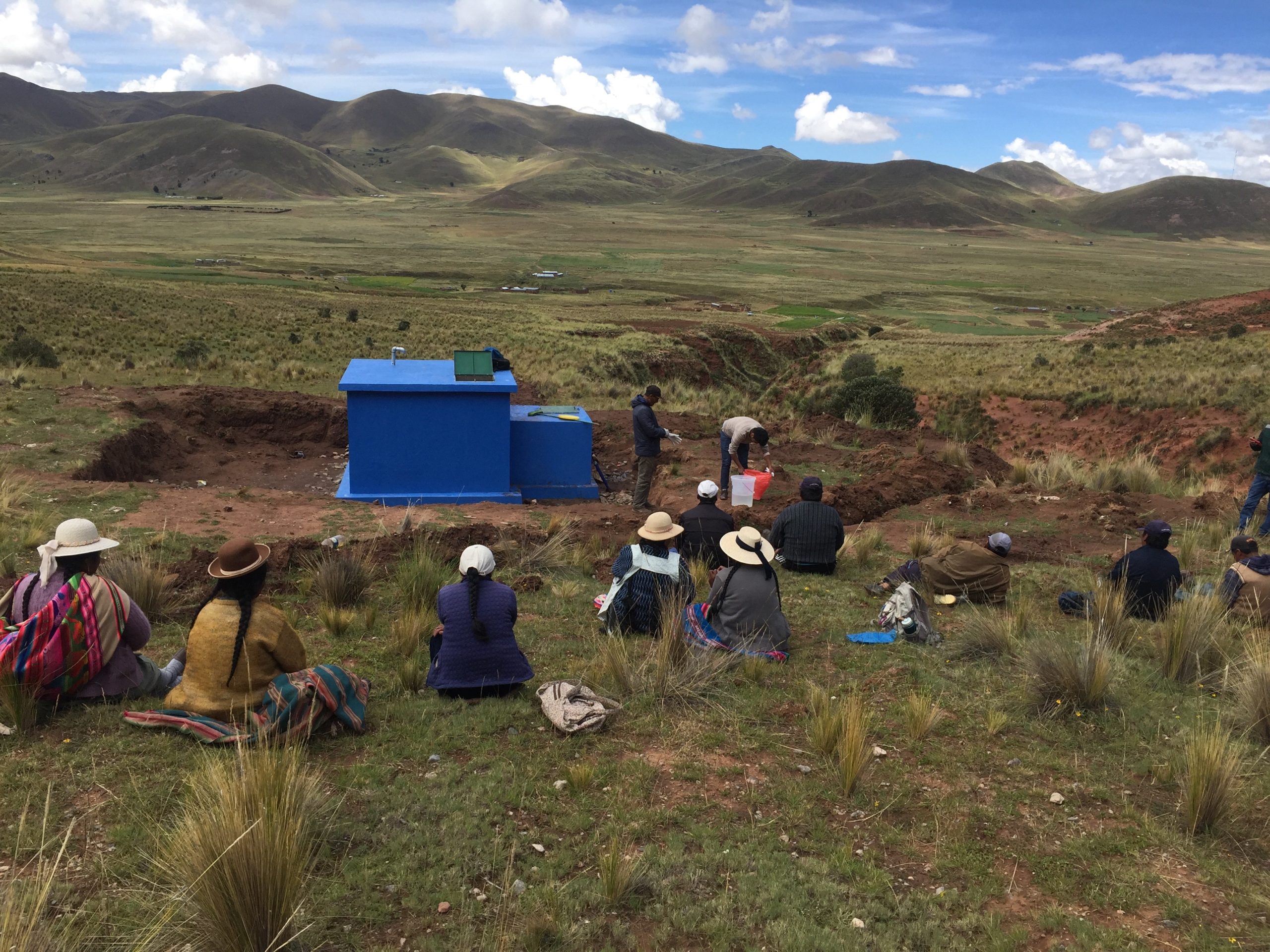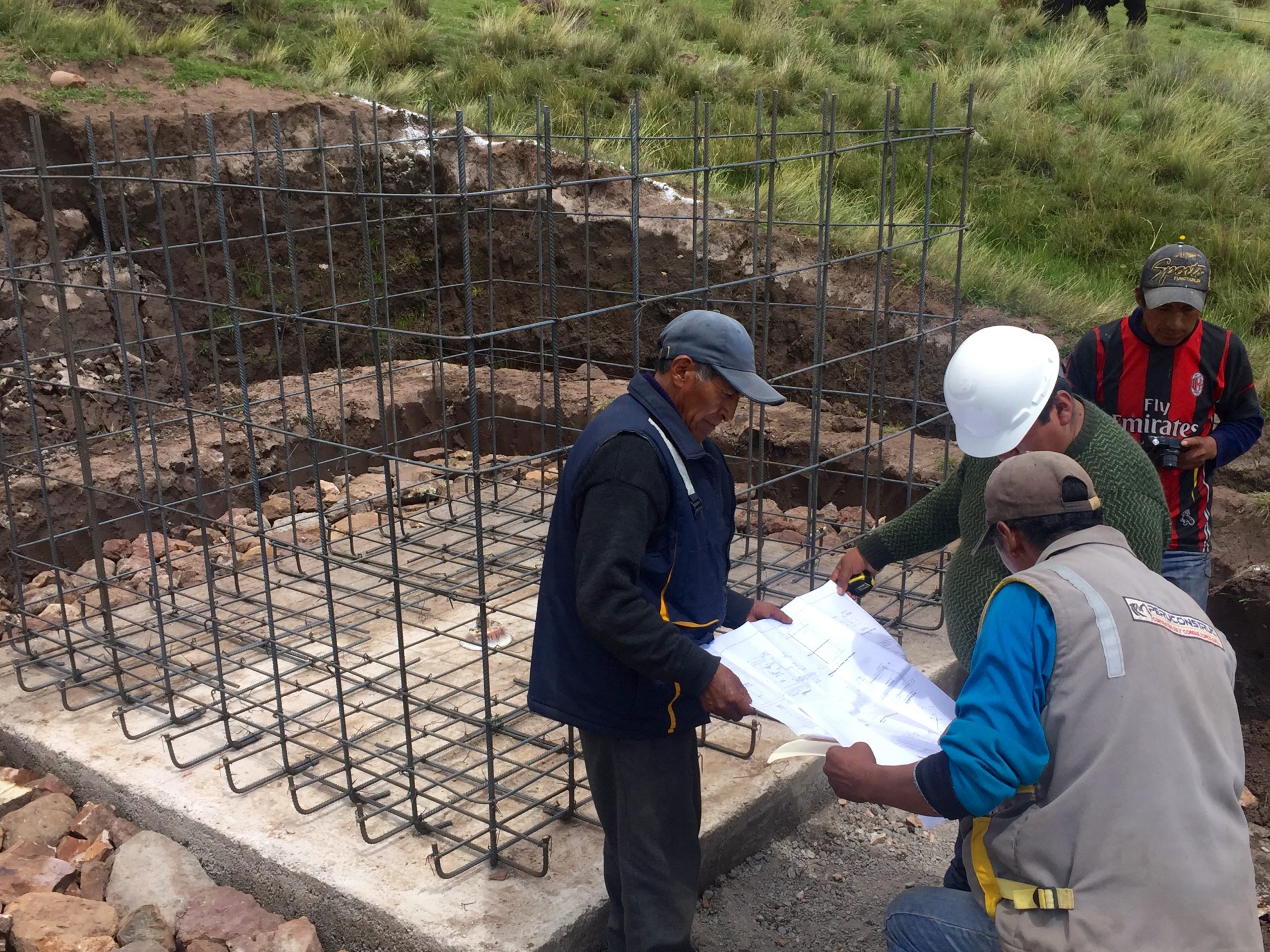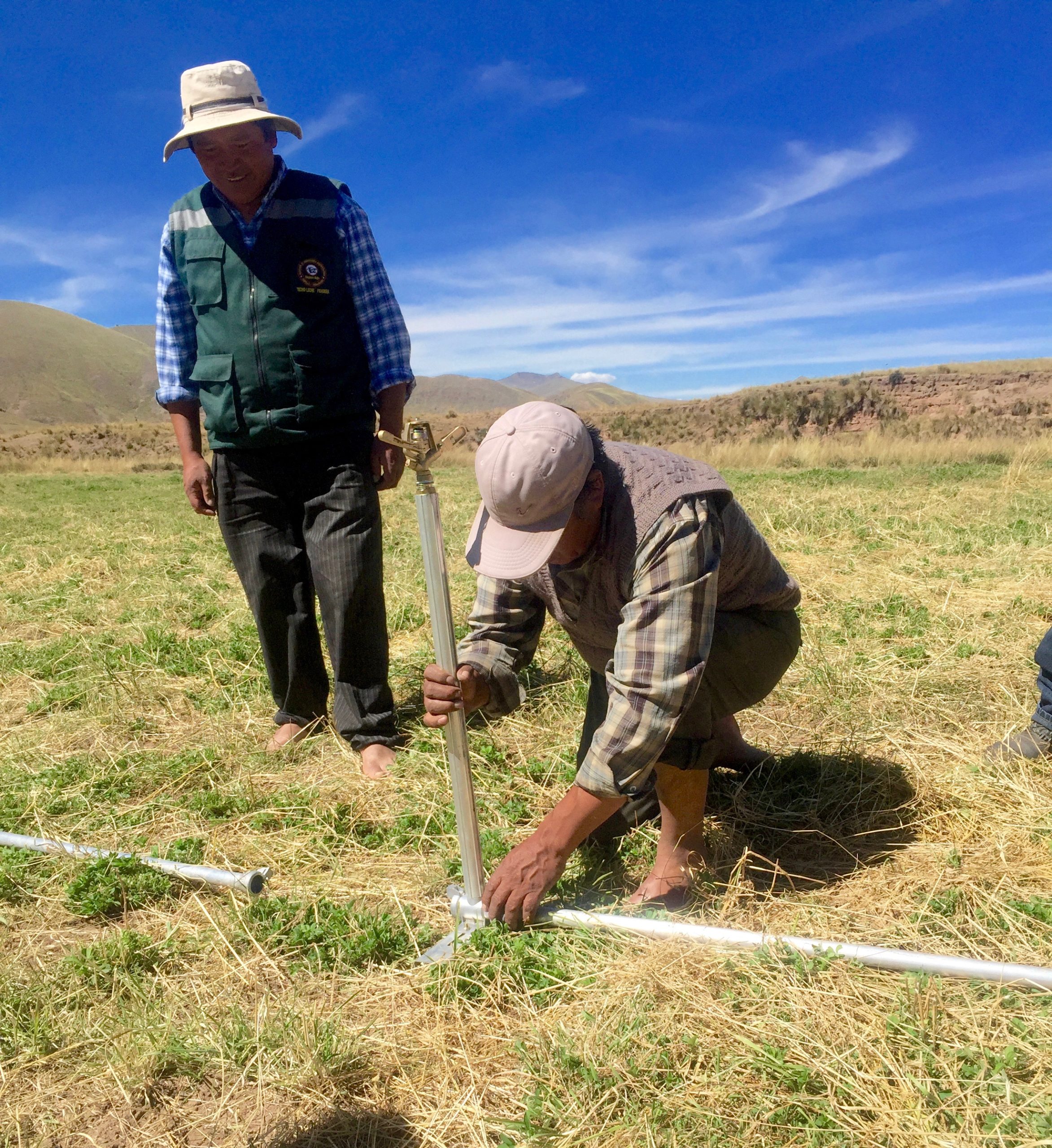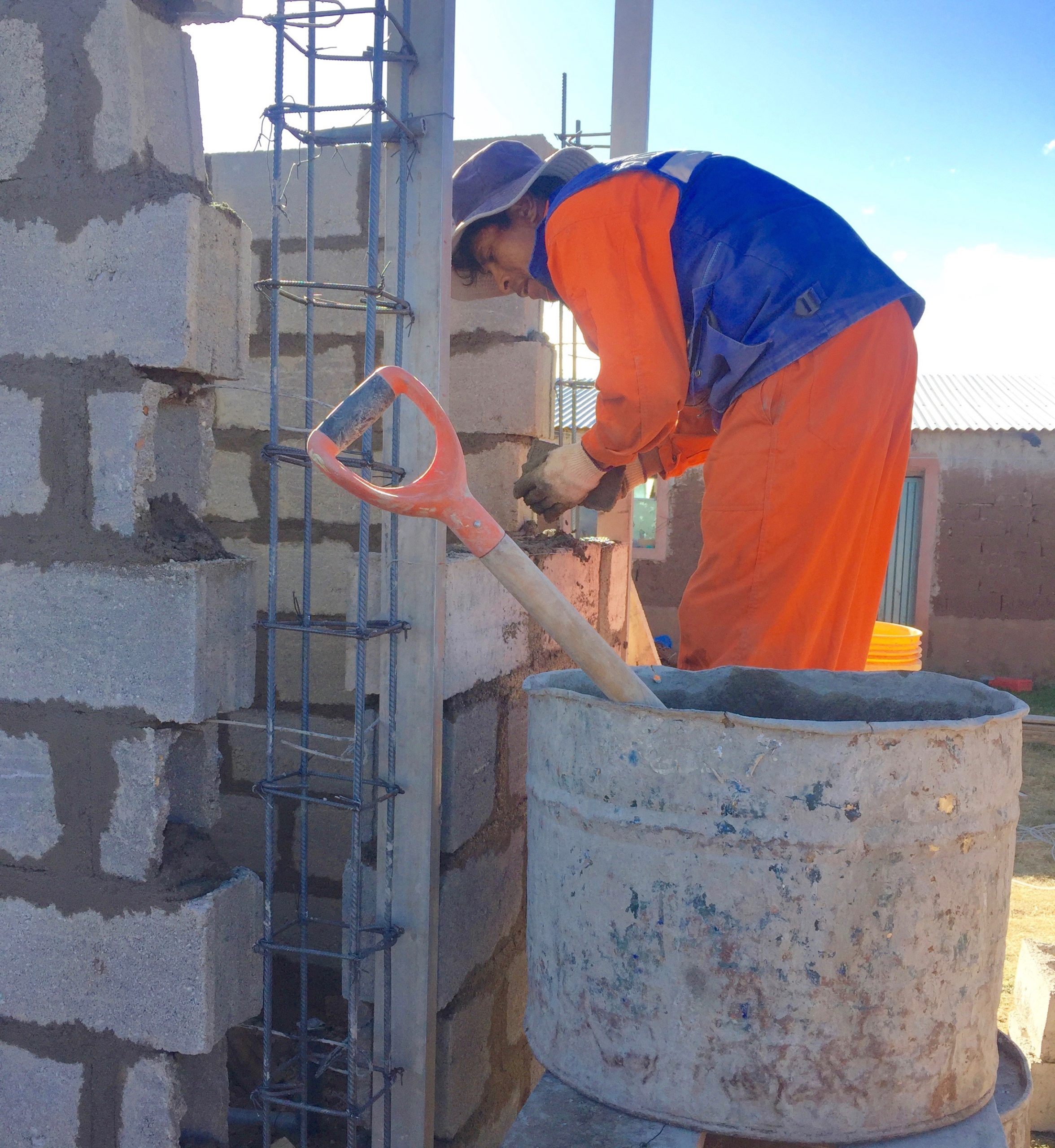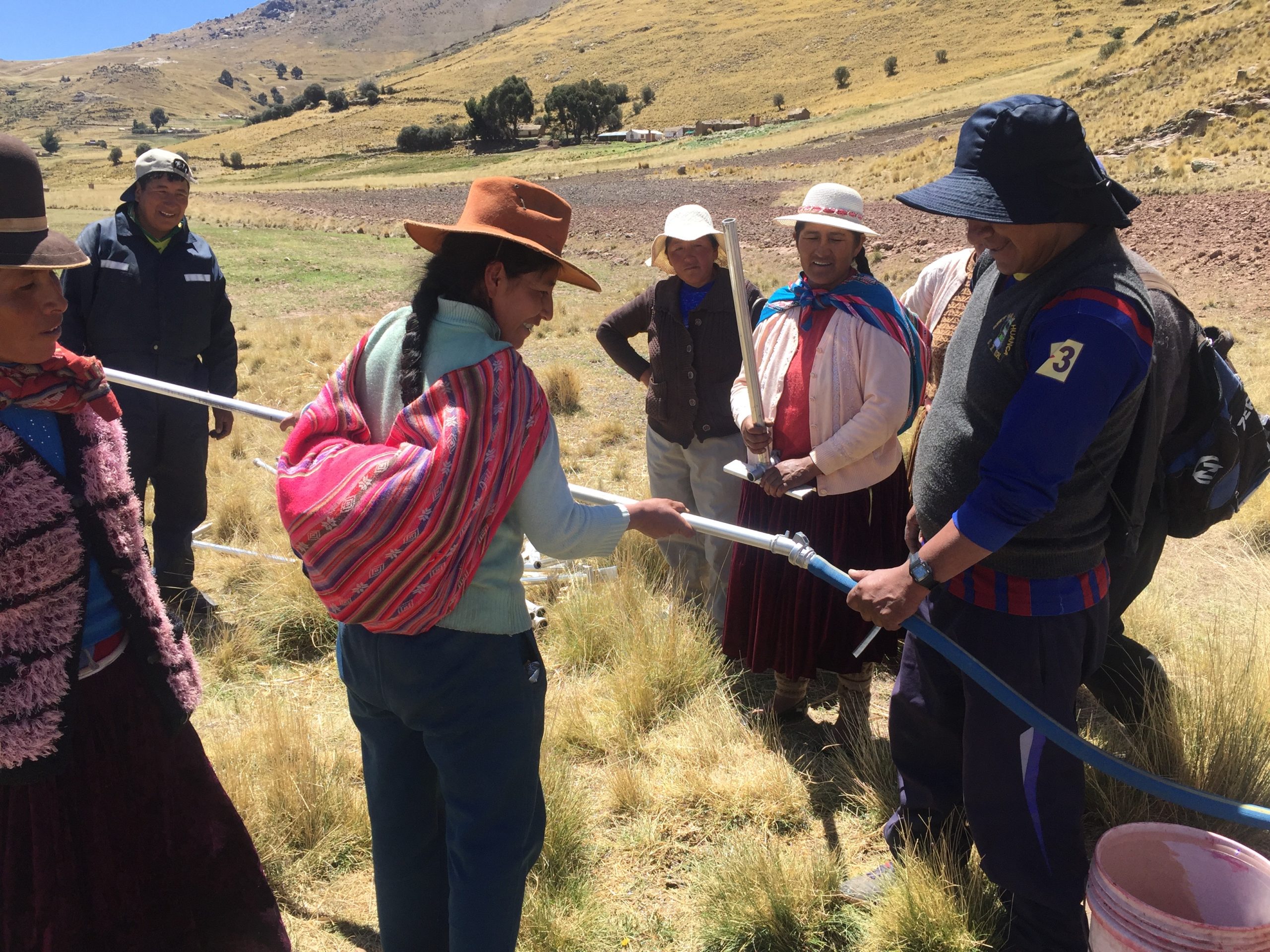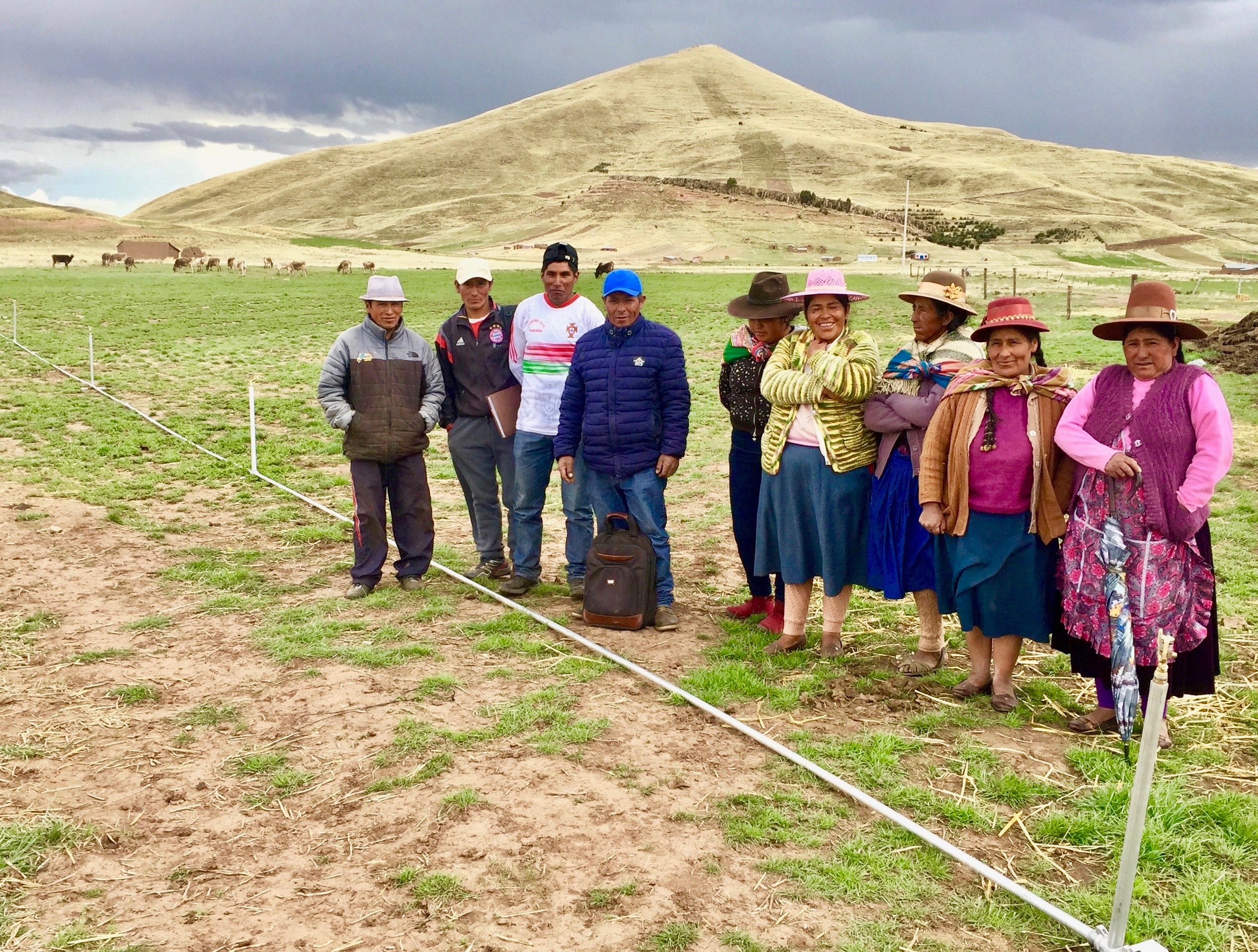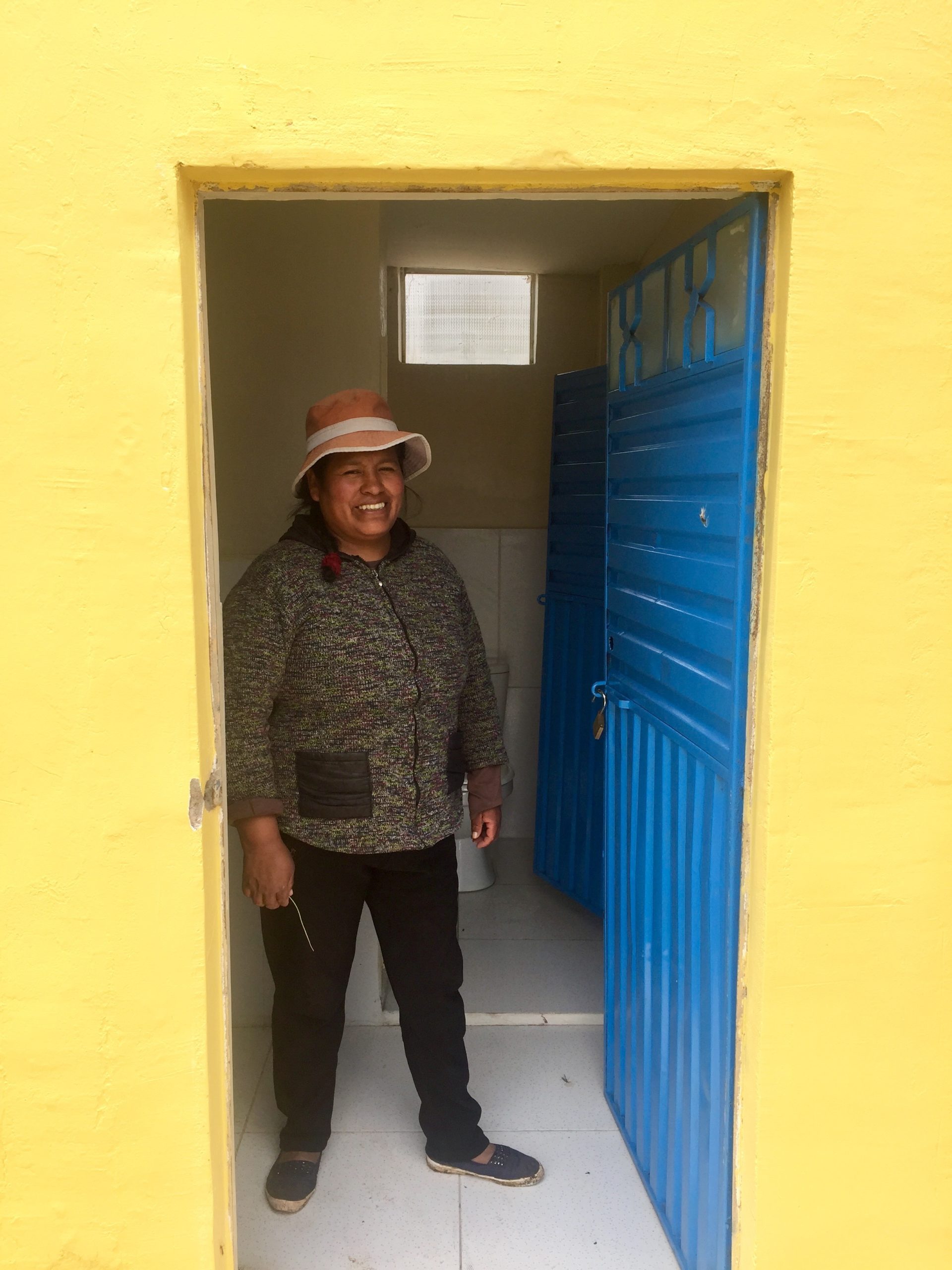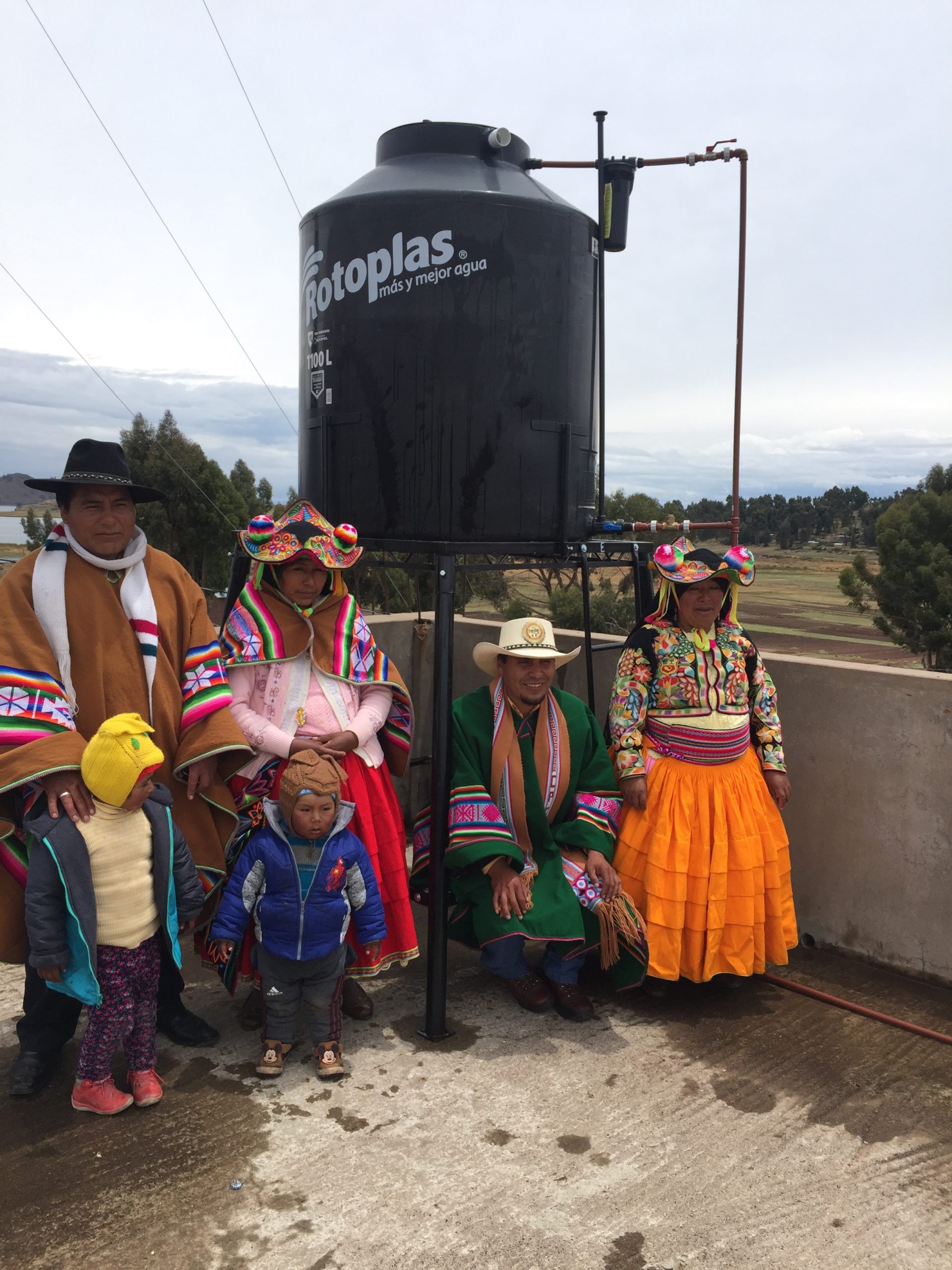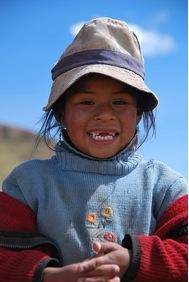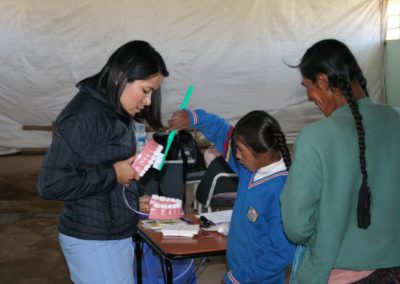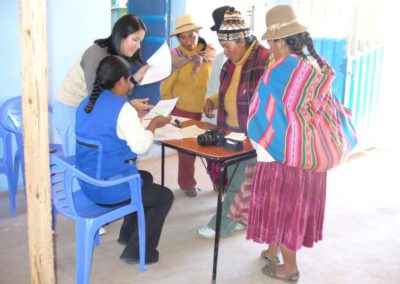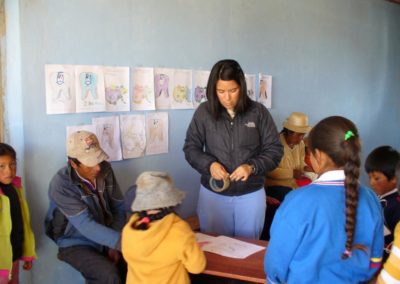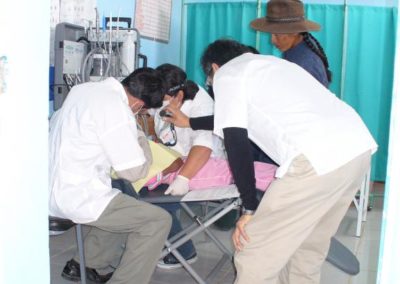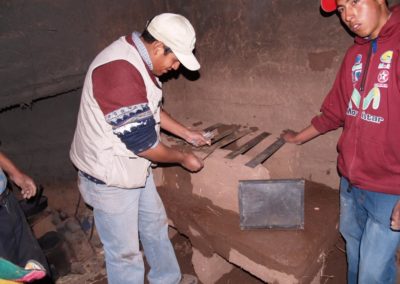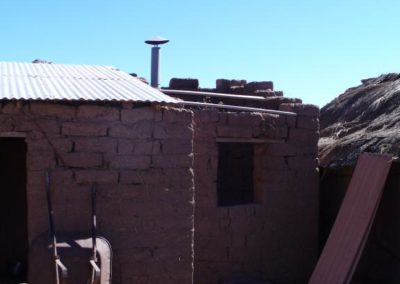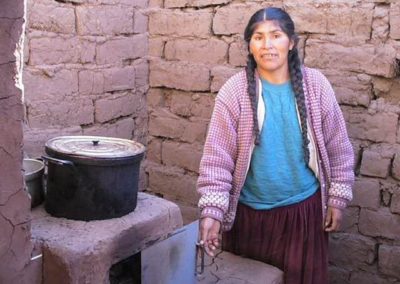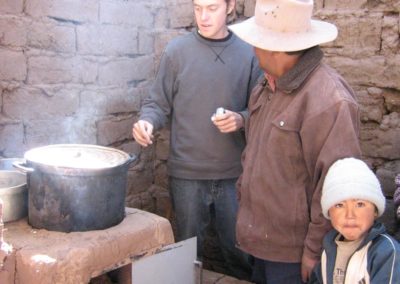Health and the Environment
The Altiplano Water Program is a collaboration between The Chijnaya Foundation, Asociación Pro-DIA, Water Charity, and The National Peace Corps Association. Ten water infrastructure projects were implemented in 2019 and 2018 with the goal of improving community health and the family economy by improving access to water and sanitation.
2019
Alto Angará
A water catchment system, a 2 m³ water storage tank, and a piping distribution system were constructed to provide running water to 8 families. Additionally, 0.75 m³ individual water storage tanks, water catchment systems, and piping distribution systems were constructed on the property of 8 families to provide running water to families living in remote locations within the community. This project provided running water to families within a community that previously did not have a potable water system.
Asociación Incasamana- Ccotos
Asociación Incasamana is a tourism association located in the community of Ccotos. Six members of the group used project funds to buy and install solar thermal water heaters and elevated plastic storage tanks on their bathrooms. The other 4 members of the association used project funds to construct new bathrooms that are closer to their houses and more adequate for tourists. This project not only helped the association invest in infrastructure to improve the local tourism industry, but it also improved access to water and sanitation in their households.
Llicllica
The community of Llicllica did not have a functioning water system before project implementation and was drinking water from open and contaminated sources. This project constructed a 6 m³ cement water storage tank that was connected to the district capital water supply and an existing piping distribution within the community to provide access to running water to the 36 households within the community.
Angará Bajo
Project funds were used to purchase small-scale sprinkler irrigation systems for 12 families. The irrigation systems can be connected to existing water sources and will allow farmers to extend the growing season of their crops. Without irrigation systems, families struggle to provide a nutrient rich diet to their cattle during the long dry season months.
2018
Jallahua
Project funds were used to purchase small-scale sprinkler irrigation systems for 12 families. The irrigation systems can be connected to existing water sources and will allow farmers to extend the growing season of their crops. Without irrigation systems, families struggle to provide a nutrient rich diet to their cattle during the long dry season months.
Colquejahua
Project funds were used to purchase small-scale sprinkler irrigation systems for 12 families. The irrigation systems can be connected to existing water sources and will allow farmers to extend the growing season of their crops. Without irrigation systems, families struggle to provide a nutrient rich diet to their cattle during the long dry season months.
C.P. Chijnaya Health Post
The health post located in the community of Chijnaya was connected to the local water distribution system that provides the community with water for 2 hours a day. Project funds were used to install an underground water storage tank and electric pump that pumps water to an elevated water storage tank on top of the health post to ensure a secure supply of water to the health post 24 hours a day. The bathrooms at the health post were also redone to provide adequate and sanitary bathrooms.
C.P. Ccotos Municipality
Project funds were used to construct 2 public restrooms inside the municipality building in the community of Ccotos. An elevated storage tank and necessary piping were also installed on top of the municipality to ensure a secure supply of water to the bathrooms 24 hours a day.
Dental Health Education and Prevention Program
The effort is a response to community members’ repeated requests for dental services and well documented need. In 2008, a group of graduate students from Loma Linda University’s School of Public Health conducted a dental health education and prevention program in Chijnaya and noted a high prevalence of cavities when they offered fluoridation to children.
A subsequent needs assessment (February, 2010), involving examination of 244 Chijnayans, provided epidemiological data demonstrating extensive need for dental treatment, particularly for caries control, extractions, root canal treatment, and prosthodontics.
With a new mobile dental unit and patient chair, purchased with a generous grant from a U.S. family foundation, representatives from PADA, the Chijnaya Foundation, and the Chijnaya community, along with four Puno area dentists, provided services to 305 patients during the inaugural April 2010 clinic. For a small contribution, patients were provided extensive oral health education, with an emphasis on the importance of regular toothbrushing, as well as the following services: oral examinations, fillings for caries, extractions, deep cleanings, pulpotomies for children, and fluoridation for youngsters aged 6-12.
The Oral Health Team (Left to Right):
Dra. Carmen Sanchez Herencia (dentist from Juliaca), Lic. David Cajo (Chijnaya Foundation Board member and Field Representative), Bruno Callata Tapia (mayor of Chijnaya), Zenovia Paricela Huancollo (volunteer community health promoter), Dr. Ann Stromberg (Chijnaya Foundation Board member and health specialist), Vicentina Alta Turpo (nurse at Chijnaya health post), Dr. Carlos Barriales Acosta (dentist from Puno), Dr. Juan Carlos Franco Barriga (dentist from Puno), Dra. Maria del Carmen Aragon Quispe (dentist from Juliaca), Dr. Oscar Trigoso (Founding President of the Peruvian American Dental Association). Not pictured: the photographer Silvia Trigoso, M.P.H, (PADA public health specialist), and other supporting members of the Chijnaya community including Jose Araca, Secretary, and Ismael Cayra, Chinaya Health Committee member.

The Suma Quta (pronounced “Sue-muh koh-tuh”) Project began in 2009 and combines the efforts of numerous Peru- and U.S.-based nonprofits and universities, as well as regional government agencies in Puno, Peru, in developing public information about water quality and appropriate technologies and best practices for communities that have water sources that are risky or dangerous for human consumption

Community-Based Water Monitoring Program
Since 2009, The Chijnaya Foundation and the Puno-based nongovernmental action group Suma Marka have worked with Global Water Watch in building Peru’s first comprehensive community-based water monitoring program. Now, 58 monitors–mostly local community leaders and college students at the local National University of the Altiplano– have been trained in 2 or 3 day long courses to do physico-chemical and bacteriological water monitoring using portable kits and incubators built from Styrofoam boxes, 15 watt light bulbs, and thermometers. The information gathered monthly by monitors at a dozen stations around the lake basin is available to the public, and is meant to provide local activists with data that shows where the nature and location of pollution entering surface waters. This is a critical step in being able to press regional and federal agencies to remediate polluted sites and stop new pollution from entering rivers and the lake.
Double Water Supply and Reduced Pathogen Exposure
In June 2011, on the basis of tests that showed dangerous levels of e Coli in the water supply of the rural community of Parina, one of our certified water monitors, Ricardo Quispe, convinced his village government to provide materials and labor to clean up a water source. Working with a visiting Masters in Public Health student from Loma Linda University, community members in Parina built a system that has doubled their water supply and reduced exposure to the pathogens from the spring head. The community now has set its sights on remediating a neighboring well. Seeing how much can be achieved through community-municipality-civic collaboration, neighboring villages are keen to copy this model.
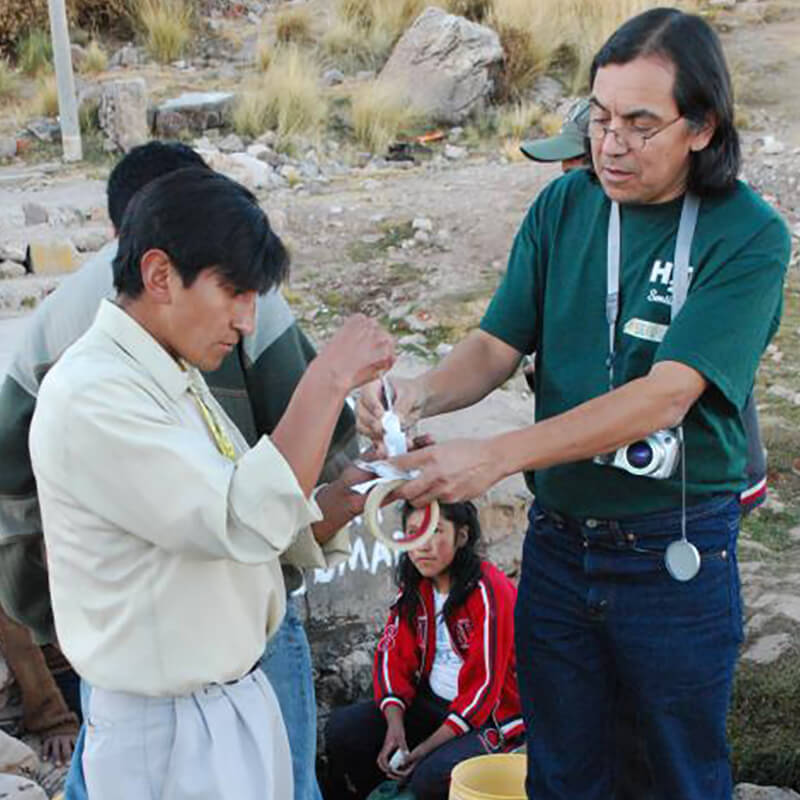
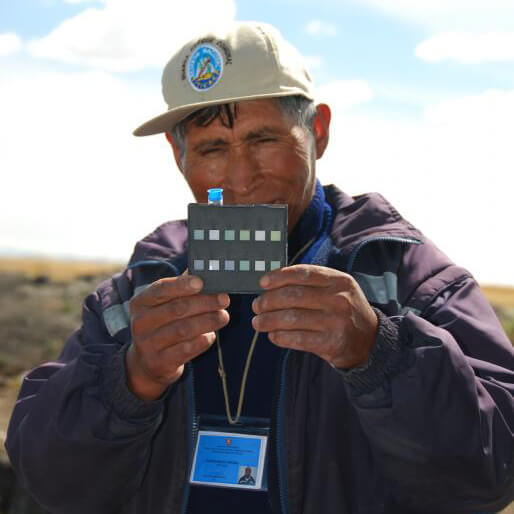
Pilot Project for Constructing Well Filters
In summer and fall of 2011, Suma Marka and The Chijnaya Foundation teamed with the Engineers without Borders chapter at the University of California (EWB-UCB) to initiate a pilot project in constructing filters for wells in the region that have dangerous levels of toxic arsenic in the water. The filters are simple, inexpensive, and can be made by local technicians with basic training. They use perforated ceramic pots filled with layers of broken brick, polyester cloth, fine and course sand, charcoal, and rusty iron scraps. This simple design has proven effective in other parts of the world where arsenic is similarly a significant problem. To carry out the project, the Suma Quta partners entered into an agreement with the Puno Directorate of Public Health (DIRESA) to create a public-private effort that matches community surveys and filter development with outreach and monitoring by DIRESA’s rural doctors and nurses. The EWB-UCB has made a five-year commitment to the project, with stated goals of working with regional health authorities to scale up arsenic sampling in wells in Puno and filter availability for families whose wells exceed health standards.
Ceramic Household Water Filters
In 2012, there are plans to undertake a feasibility study for a small factory that could make ceramic household water filters with colloidal silver paint (a “Potters-for-Peace” innovation used around the world). This filter has low unit cost and has been proven effective in removing bacteria and parasites from contaminated water. A Pomona College senior is preparing to supervise the study in conjunction with leadership from Suma Marka in Puno.
NEEDS of the Suma Quta network include operating expenses for full-time coordinators in Puno, equipment for Total Suspended Solids sampling and metals analysis, equipment and laboratory support for mass arsenic sampling and analysis, equipment for limnological biosampling, GIS training and software licensing for our Peru partners, and a zodiac for deep-water sampling, especially near intake pipes for municipal water systems.
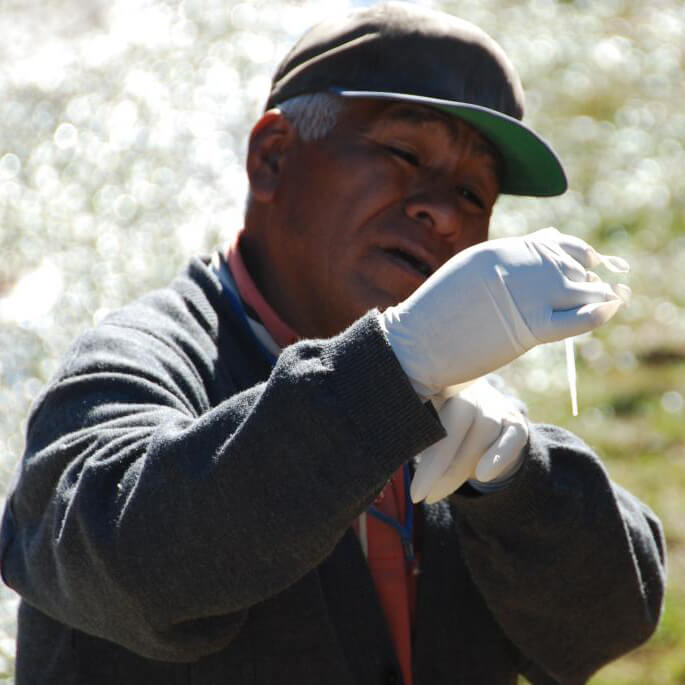
In response to needs identified by the community, the Chijnaya Foundation sponsors periodic health promotion campaigns to supplement the services provided by Chijnaya’s Health Post and the Health Center in Pucara. These campaigns are carried out in collaboration with other groups, such the Health Committee formed by residents of Chijnaya, personnel from the Health Center in Pucara, the Puno Lions Club, and the Global Health Department of Loma Linda University. Community residents who attend the special clinics contribute small fees ($1 or less) for the services provided.
In 2007, four students from the Global Health Department of Loma Linda University’s School of Public Health, along with their professor, Ann Stromberg, offered a campaign focused on eye care.

Our Health Promotion Campaigns Have Included:
- Provided education on eye care and prevention of eye problems, using small group discussions and an evening of community theater, music, and dance. Community members collaborated with the Loma Linda students in writing the script for scenes addressing aspects of eye care and did all of the acting as well as performances of dance, poetry, and song.
- Screened all school children in Chijnaya and a neighboring community for problems with vision.
- Hired a Quehua-speaking ophthalmologist and assistant from Cusco, for a six-day clinic, to examine the eyes and vision of children, youth, and adults. Some 430 residents received eye examinations.
- Worked with the Puno Lions Club volunteers to provide corrective lenses for persons needing glasses.
- Assessed contributing factors to eye problems, e.g., high altitude (13,000’) combined with outdoor work that increases exposure to UV rays; frequent exposure to wind and dirt; indoor smoke and particulate matter from cooking fires in unventilated kitchens
- Promoted the wearing of hats and sunglasses to protect residents’ eyes from such risk factors and to prevent the early onset of cataracts and pterygium.
- Provided funding for two people to have surgery for pterigium and cataract surgery for a small number of seniors from Chijnaya. Further follow-up for cataract surgery is still needed.
- Provided two well-attended presentations on nutrition, by Peruvian nutritionist Neda Pomé , a member of the Loma Linda team.
The Chijnaya Foundation looks forward to collaborating in additional health promotion campaigns in Chijnaya and other communities. We welcome inquiries from health care providers who might wish to work with us in the future.
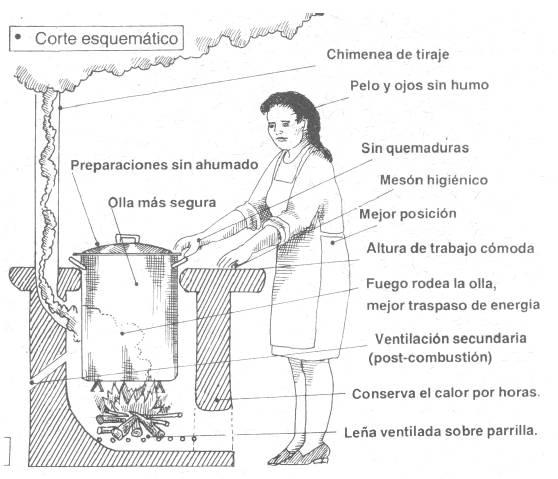
Older open hearths expose households to high levels of particulate matter and toxins.
New Stoves Conserve Fuel, Heat Efficiently, & Reduce Risk of Burns
The Foundation’s improved stoves project is evolving. An assessment of the project to date by Loma Linda University Global Health students and faculty found that families are uniformly enthusiastic about adopting the improved technology, recognizing its health benefits. Some early adopters of improved stoves, however, found that rust formed in their chimney pipes, and the Foundation is studying alternative designs using bricks and concrete for chimney construction. When this research is completed, the Foundation will be replacing the metal chimneys for families that experienced problems while implementing a superior design for households who build new stoves in the future.

